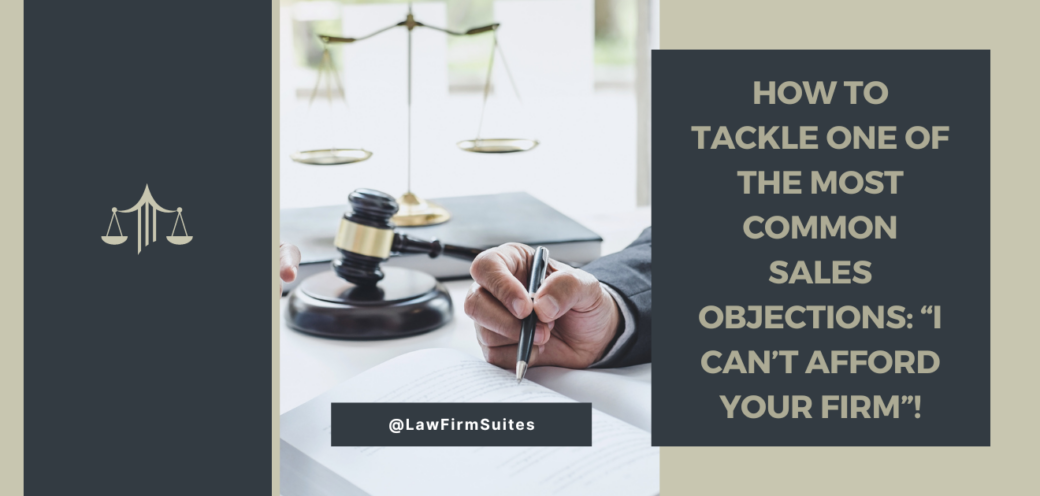Learn how to be prepared to tackle the common law firm sales objection, build trust and turn more leads into advocates and paying clients.
Imagine you’ve ever been on a call or in a consultation meeting with a potential client only to hear “I can’t afford your firm.” You’ll be left feeling unsure or confused, questioning where things went wrong or what should have done differently. Maybe it’s the price of your services, the offer, or even the pitch. It’s easy to get lost wondering what happened and what needs to change so this doesn’t happen again.
We all wish for easy deals and to have clients who are excited about the sale, but that is not always the case. The good news is, when you understand what “I can’t afford it” really means, you gain a whole new perspective on the client’s situation and should set you to actually close the deal instead of losing it.
This is because “I can’t afford your firm”, usually has nothing to do with money. Your potential client is actually trying to be polite. They don’t think your firm is the right answer to their problem and these words are an easy way for them to avoid an awkward situation.
It’s human nature to avoid awkward situations and to be polite when turning an offer down. But when saying “I can’t afford your firm” they are more often than not referring to one of these three real objections:
- I don’t believe in your firm.
- I don’t believe you.
- I don’t believe in myself.
Now that you’re a little clearer on why your prospect said they can’t afford it, here’s five things you can do next time a client says “I can’t afford it.”
Be Empathetic Before Anything Else
As soon as you hear those crude words, the first thing you should do is respond with empathy. Nobody likes the hard sell, like what you get from a used-car salesman. The hard sales approach would result in firing questions back right away without considering the client’s true objection. So starting with empathy and understanding is going to get you a lot further than the other option.
When you respond with understanding and respect, you build trust and takes the pressure off the potential client. The client probably isn’t sure how you’re going to respond, with empathy or with a firestorm of questions. Thus they will be grateful that you chose the former and didn’t push harder for answers why.
To help, here is a phrase you can use as your first response when you get the “I can’t afford your firm” objection. “Thank you for sharing and being honest with me. I completely understand how it feels to see a product or service you’d love to invest in but feel you can’t afford it. So you’re not alone!”
Ask (The Right) Questions
Now it is time for you to put your detective hat and get some answers. Odds are that the “I can’t afford your firm” excuse likely isn’t the real reason for your potential client’s hesitation to say yes. So what is the real reason then? You need to start asking the right questions to figure that out.
Here are some options that you might want to keep in your locker so you’re ready at a moments notice:
- If money were no object, would you invest in this agreement?
- What would need to be included/what would need to change for you to invest in this agreement?
- Do you feel confident that this agreement would help you resolve your matter?
Don’t Be Afraid To Walk Away
Walking away and letting your prospect off the hook is an effective strategy that still feels good! You’re not going to close every deal, so don’t burn bridges by trying to do so. Rather than pushing for a sale, respond with empathy, ask your questions and if you don’t think things are going to work out then just let things end as they are.
Offer to answer other questions before you end the consultation, which is another great way to build trust, which can set yourself up nicely should they decide to come back.
Essentially, remember that it is perfectly acceptable to just thank them for their time, shake hands and move on.
Follow Up
Statistically, 92% of salespeople will only follow up four times, but strangely enough, 80% of prospects claim to say no four times before saying yes. Your follow up isn’t just crucial, it’s essential.
If you leave the consultation without getting a yes from the potential client then you’re leaving money on the table. Instead, use information from your first meeting (remember to take notes during the meeting of course!) to craft a personal follow-up. Emphasis on the personal!
Put empathy at the forefront and show a genuine interest in helping your potential clients make the best decision for them. But if you took personal notes during the meeting too, like upcoming vacations, recent books, kids sports or anything like that, don’t be afraid to bring those up too. That will also go a long way towards showing the client that you truly care.
If you follow these tips and steps, you’ll be prepared to tackle the common “I can’t afford your firm” objection, build trust and turn more leads into advocates and paying clients.


